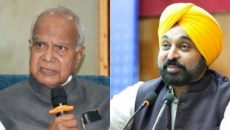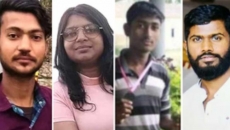Kathmandu, Jan 5 (IANS) External Affairs Minister S. Jaishankar on Friday returned to New Delhi following his two-day trip to Kathmandu during which he co-chaired the seventh meeting of the Nepal-India Joint Commission and also inaugurated several projects.
Besides attending the meeting, also visited the Pashupatinath Temple, witnessed some agreements being signed and held talks with President Ram Chandra Poudel, Prime Minister Pushpa Kamal Dahal, Nepali Congress President Sher Bahadur Deuba, Leader of the Opposition K.P. Oli, among others.
आज बिहानै पशुपतिनाथ मन्दिरको दर्शन गर्न पाउँदा मन आनन्दित भएको छ ।
— Dr. S. Jaishankar (@DrSJaishankar) January 5, 2024
🇮🇳 -🇳🇵सम्बन्ध र हाम्रा दुई देशका जनताको कल्याणका लागि प्रार्थना गरेँ । https://t.co/jzo8Mv6DUn
"Under the leadership of Prime Minister Nrendra Modi, the government of India is committed to continuing to redefine its relationship with partners in our neighborhood especially with Nepal," he said while inaugurating the 58 post-earthquake reconstruction projects in Nepal with the support of the Centre in New Delhi.
He also inaugurated the library building of Tribhuvan University, the oldest university in Nepal which was funded by the government of India.
Speaking at the joint inauguration of Tribhuvan University Central Library & other post-earthquake reconstruction projects in Kathmandu
— Dr. S. Jaishankar (@DrSJaishankar) January 5, 2024
https://t.co/qNdBj08x7f
Jaishankar and his Nepali counterpart N.P. Saud jointly inaugurated the 58 post-earthquake reconstruction of Nepal. Among them are 25 schools, 32 health facilities, and culture sector projects.
"The completion of the projects in Nepal was the commitment made by Prime Minister Modi on Nepal’s post-reconstruction," said Jaishankar.
"In recent years, we have witnessed the real transformation of the India-Nepal relation... This partnership has expanded multifold, and connectivity-physical, digital, and energy-related has become a cornerstone for this expanding collaboration.
"In the past few years, reconstruction has been an area where we have received a substantial level of financial support from India," said Saud, adding that with the support of New Delhi, a significant number of private homes have been successfully rebuilt in Gorkha and Nuwakot districts.
Earlier, India had supported the construction of 50,000 houses in Gorkha (26,912 beneficiaries) and Nuwakot (23,088 beneficiaries)
After seeing off Jaishankar at the Tribhuvan International Airport, Minister Saud said: “Together, we successfully concluded the important meeting of the Nepal-India Joint Commission and delivered positive outcomes for the mutual benefits of our countries. We will continue to work together to maintain this momentum of Nepal-India friendship.”
During his stay in Kathmandu, the External Affairs Minister also met office bearers of the Cricket Association of Nepal (CAN) and assured them that India will provide all possible support for Nepali cricket.
According to Nepal’s Ministry of Foreign Affairs, the Joint Commission expressed satisfaction over the progress made by the government of India assisted post-earthquake reconstruction in housing, education, health, and cultural heritage sectors in Nepal.
Following the meeting, the two ministers witnessed the exchange of agreement between the government of Nepal and the government of India on Long Term Power Trade.
Jaishankar and Saud also remotely inaugurated the 132 kV cross-border transmission lines between Nepal and India 00 the second circuit of the Raxaul- Parwanipur line, the second circuit of Kataiya-Kusaha line, and the New Nautanwa-Mainhiya lines.
The other agreements exchanged included an agreement between the government of Nepal and the government of India regarding Indian Grant Assistance for the Implementation of High Impact Community Development Projects (HICDPs), Launch Service Agreement for Munal Satellite and MoU for Cooperation in Renewable Energy Development.
The fifth tranche of post-Jajarkot earthquake relief supply provided by India to the government of Nepal was handed over remotely.
The tranche consists of prefabricated houses, tents, and other relief materials.






